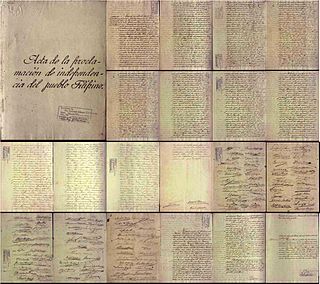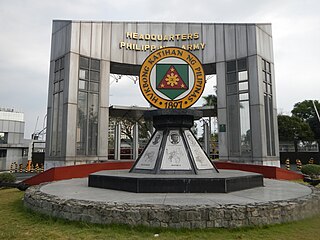
Spanish was the official language of the Philippines from the beginning of Spanish rule in the late 16th century, through the Philippine–American War (1899-1902) and subsequent United States colonization and remained co-official after independence in 1946, along with English, until 1973. Its status was initially removed in 1973 by a constitutional change, but after a few months it was re-designated an official language again by a presidential decree. With the present Constitution, Spanish became designated as an auxiliary or "optional and voluntary language".

Jose Maria Canlas Sison, also known by his nickname Joma, was a Filipino writer and activist who founded the Communist Party of the Philippines and added elements of Maoism to its philosophy – which would be known as national democracy. He applied the theory of Marxism–Leninism–Maoism to the history and current circumstances of the Philippines.

Camp General Rafael T. Crame is the national headquarters of the Philippine National Police (PNP) located along Epifanio de los Santos Avenue (EDSA) in Quezon City. It is situated across EDSA from Camp Aguinaldo, the national headquarters of the Armed Forces of the Philippines (AFP). Prior to the establishment of the civilian PNP, Camp Crame was the national headquarters of the Philippine Constabulary, a gendarmerie-type Military police force which was the PNP's predecessor.
Ilocano literature or Iloko literature pertains to the literary works of writers of Ilocano ancestry regardless of the language used - be it Ilocano, English, Spanish or other foreign and Philippine languages. In Ilocano language, the terms "Iloko" and "Ilocano" are different. Generally, "Iloko" is the language while "Ilocano" refers to the people or the ethnicity of the people who speak the Iloko language.
Philippine literature in English has its roots in the efforts of the United States, then engaged in a war with Filipino nationalist forces at the end of the 19th century. By 1901, public education was institutionalized in the Philippines, with English serving as the medium of instruction. That year, around 600 educators in the S.S. Thomas were tasked to replace the soldiers who had been serving as the first teachers. Outside the academe, the wide availability of reading materials, such as books and newspapers in English, helped Filipinos assimilate the language quickly. Today, 78.53% of the population can understand or speak English.

Filipino nationalism refers to the establishment and support of a political identity associated with the modern nation-state of the Philippines, leading to a wide-ranging campaign for political, social, and economic freedom in the Philippines. This gradually emerged from various political and armed movements throughout most of the Spanish East Indies—but which has long been fragmented and inconsistent with contemporary definitions of such nationalism—as a consequence of more than three centuries of Spanish rule. These movements are characterized by the upsurge of anti-colonialist sentiments and ideals which peaked in the late 19th century led mostly by the ilustrado or landed, educated elites, whether peninsulares, insulares, or native (Indio). This served as the backbone of the first nationalist revolution in Asia, the Philippine Revolution of 1896. The modern concept would later be fully actualized upon the inception of a Philippine state with its contemporary borders after being granted independence by the United States by the 1946 Treaty of Manila.
Ninotchka Rosca is a Filipina feminist, author, journalist, and human rights activist. best known for her 1988 novel State of War and for her activism, especially during the Martial Law dictatorship of former Philippine President Ferdinand Marcos. Rosca has been described as "one of the major players in the saga of Filipina American writers."

Cecilia Manguerra Brainard is an author and editor of 20 books. She co-founded PAWWA or Philippine American Women Writers and Artists; and also founded Philippine American Literary House. Brainard's works include the World War II novel, When the Rainbow Goddess Wept, The Newspaper Widow, Magdalena, and Woman With Horns and Other Stories. She edited several anthologies including Fiction by Filipinos in America, Contemporary Fiction by Filipinos in America, and two volumes of Growing Up Filipino I and II, books used by educators.
Lualhati Torres Bautista is a Filipina writer, novelist, liberal activist and political critic. Her most popular novels include Dekada '70; Bata, Bata, Pa'no Ka Ginawa?; and ‘GAPÔ.
Azucena Grajo Uranza is a Filipino novelist, short story writer, and playwright in the English language.
Angela Manalang Gloria (1907–1995) was a Filipina poet who wrote in English.

Fort Andres Bonifacio is the site of the national headquarters of the Philippine Army located in Metro Manila, Philippines. The camp is named after Andres Bonifacio, the revolutionary leader of the Katipunan during the Philippine Revolution.

Ricardo Arreola Lee is a Filipino screenwriter, journalist, novelist, and playwright. He was conferred the Order of National Artists of the Philippines for Film and Broadcast Arts in 2022.

Lope K. Santos was a Filipino Tagalog-language writer and former senator of the Philippines. He is best known for his 1906 socialist novel, Banaag at Sikat and to his contributions for the development of Filipino grammar and Tagalog orthography.

Ermita: A Filipino Novel is a novel by the known Filipino author F. Sionil Jose written in the English language. A chapter of this novel was previously published as a novella in the books titled Two Filipino Women and Three Filipino Women.
The history of Filipino women writers is an account of how Philippine women became literary “mistresses of the ink” and “lady pen-pushers” who created works of fiction and non-fiction across the genres. Writing in English, Spanish, Filipino and other local languages and native dialects, female writers from the Philippine archipelago utilized literature, in contrast with the oral tradition of the past, as the living voices of their personal experiences, thoughts, consciousness, concepts of themselves, society, politics, Philippine and world history. They employed the “power of the pen” and the printed word in order to shatter the so-called "Great Grand Silence of the Centuries" of Filipino female members, participants, and contributors to the progress and development of the Philippine Republic, and consequently the rest of the world. Filipino women authors have “put pen to paper” to present, express, and describe their own image and culture to the world, as they see themselves.

Twice Blessed, also known as Twice Blessed: A Novel, is a 1992 novel written by Filipino author Ninotchka Rosca. It won the 1993 American Book Award for “excellence in literature”. It is one of Rosca’s novels that recreated the diversity of Filipino culture. Apart from tracing back Philippine History, Rosca also portrayed contemporary Philippine politics, delicate events, and cultural preferences through the novel.

Anino ng Kahapon is a 1907 Tagalog-language novel written by Filipino novelist Francisco Laksamana. The 294-page novel was published in Manila by Santiago L. Abillar and SP during the first few years of American period in Philippine history. The 1907 version was illustrated by P Imperial. The novel was republished by the Ateneo de Manila University Press in 2002. According to the Ateneo de Manila University Press, the novel was written by Laksamana to help provide the readers with a "nostalgic recollection of the period of mournful Filipinoness". According to literary critic Epifanio San Juan, Jr. — apart from being a historical and political novel — Anino ng Kahapon was one of the romance novels and novels about heroic Philippine characters produced by Filipino authors from 1900 to contemporary times.
M. Evelina Galang is an American novelist, short story writer, editor, essayist, educator, and activist of Filipina descent. Her novel One Tribe won the AWP Novel of the Year Prize in 2004.
Lilia Quindoza Santiago was a writer and academic in the Philippines. She was named Makata ng Taon, "Poet of the Year," in 1989, and wrote the prize-winning novel Ang Kaulayaw ng Agila. Her academic work focused on languages of the Philippines as well as gender and sexuality studies, and her scholarly publications included the seminal 2002 anthology Sa Ngalan ng Ina : 100 Years of Philippine Feminist Poetry, 1889-1989.











